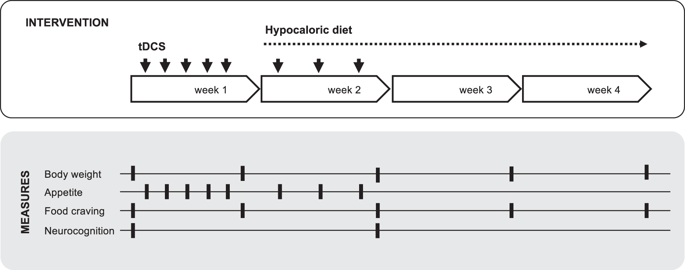当前位置:
X-MOL 学术
›
Int. J. Obesity
›
论文详情
Our official English website, www.x-mol.net, welcomes your feedback! (Note: you will need to create a separate account there.)
Neuromodulation of the prefrontal cortex facilitates diet-induced weight loss in midlife women: a randomized, proof-of-concept clinical trial.
International Journal of Obesity ( IF 4.9 ) Pub Date : 2019-11-18 , DOI: 10.1038/s41366-019-0486-x Carlos Amo Usanos 1 , Pedro L Valenzuela 2 , Pedro de la Villa 2, 3 , Santiago Milla Navarro 2 , Andresa Evelem de Melo Aroeira 2 , Ignacio Amo Usanos 1 , Liliana Martínez Cancio 4 , Luis Cuesta Villa 1 , Hetal Shah 5 , Greta Magerowski 6 , Miguel Alonso-Alonso 6
International Journal of Obesity ( IF 4.9 ) Pub Date : 2019-11-18 , DOI: 10.1038/s41366-019-0486-x Carlos Amo Usanos 1 , Pedro L Valenzuela 2 , Pedro de la Villa 2, 3 , Santiago Milla Navarro 2 , Andresa Evelem de Melo Aroeira 2 , Ignacio Amo Usanos 1 , Liliana Martínez Cancio 4 , Luis Cuesta Villa 1 , Hetal Shah 5 , Greta Magerowski 6 , Miguel Alonso-Alonso 6
Affiliation

|
BACKGROUND
High body mass index (BMI) is associated with neurocognitive impairments that contribute to overeating and interfere with weight loss efforts. Overweight and obesity at midlife can accelerate neurodegenerative changes and increase the risk of late-life dementia. Noninvasive neuromodulation represents a novel, affordable and scalable approach to improve neurocognitive function in this context. The purpose of this proof-of-concept study was to examine whether transcranial direct current stimulation (tDCS) aimed at enhancing prefrontal cortex activity could enhance weight loss, in combination with a hypocaloric diet, and study underlying mechanisms.
METHODS
Overall, 38 women with BMI 25-35 kg/m2 underwent a 4 week randomized, double-blinded, sham-controlled, and parallel-design intervention, during which they received eight sessions of tDCS (n = 18 sham, n = 20 active) in combination with a diet (caloric goal of 20 kcal/kg/day). We evaluated longitudinal changes in body weight, appetite and food craving. In addition, we examined the contribution of cognitive-executive processes via food-modified computerized tasks.
RESULTS
We found that the active group had more reduction in body weight than the sham group throughout the study (p = 0.020) and significant weekly weight loss. At 4 weeks, the active group lost 2.32% of initial body weight (sham: 1.29%). Components of subjective appetite and food craving showed a trend toward more reduction in the active group. These changes were paralleled by significant improvements in task performance in the active group, particularly in a dual task that required inhibitory control and working memory (p = 0.007-0.031). Improvement in inhibitory control performance predicted reduction in lack of control overeating, explaining 43.5% of its variance at the end of the study (p = 0.003). No significant adverse effects were observed.
CONCLUSIONS
Our results provide proof-of-concept validation of prefrontal-targeted tDCS, combined with a diet, in midlife women with excess body weight, paving the way for larger studies evaluating clinical efficacy and long-term effects of this intervention.
中文翻译:

前额叶皮层的神经调节可促进中年女性饮食引起的体重减轻:一项随机的概念验证临床试验。
背景技术高体重指数(BMI)与导致过度进食和干扰减肥工作的神经认知障碍有关。中年时期的超重和肥胖会加速神经退行性变化,并增加晚期痴呆的风险。在这种情况下,非侵入性神经调节代表了一种新颖,可负担且可扩展的方法来改善神经认知功能。这项概念验证研究的目的是检查旨在增强前额叶皮层活动的经颅直流电刺激(tDCS)与低热量饮食相结合是否可以减轻体重,并研究其潜在机制。方法总体而言,BMI 25-35 kg / m2的38名妇女接受了为期4周的随机,双盲,假手术控制和平行设计干预,在此期间,他们与饮食(热量目标为20 kcal / kg /天)一起接受了八次tDCS(n = 18假,n = 20有效)。我们评估了体重,食欲和食物渴望的纵向变化。此外,我们研究了通过食物修改的计算机化任务对认知执行过程的贡献。结果我们发现,在整个研究过程中,与假手术组相比,活动组的体重减轻更多(p = 0.020),并且每周都有明显的体重减轻。在第4周,活动组的体重减轻了初始体重的2.32%(假手术:1.29%)。主观食欲和食物渴望的成分显示出活动组中更多减少的趋势。在进行这些更改的同时,活动组的任务绩效也得到了显着改善,特别是在需要抑制性控制和工作记忆的双重任务中(p = 0.007-0.031)。抑制性控制性能的提高预示着缺乏控制性暴饮暴食的现象将减少,这解释了研究结束时其控制偏差的43.5%(p = 0.003)。没有观察到明显的不良反应。结论我们的研究结果为体重过重的中年女性提供了以额叶为靶点的tDCS结合饮食的概念验证,为更大的研究评估该干预措施的临床疗效和长期效果铺平了道路。
更新日期:2019-11-18
中文翻译:

前额叶皮层的神经调节可促进中年女性饮食引起的体重减轻:一项随机的概念验证临床试验。
背景技术高体重指数(BMI)与导致过度进食和干扰减肥工作的神经认知障碍有关。中年时期的超重和肥胖会加速神经退行性变化,并增加晚期痴呆的风险。在这种情况下,非侵入性神经调节代表了一种新颖,可负担且可扩展的方法来改善神经认知功能。这项概念验证研究的目的是检查旨在增强前额叶皮层活动的经颅直流电刺激(tDCS)与低热量饮食相结合是否可以减轻体重,并研究其潜在机制。方法总体而言,BMI 25-35 kg / m2的38名妇女接受了为期4周的随机,双盲,假手术控制和平行设计干预,在此期间,他们与饮食(热量目标为20 kcal / kg /天)一起接受了八次tDCS(n = 18假,n = 20有效)。我们评估了体重,食欲和食物渴望的纵向变化。此外,我们研究了通过食物修改的计算机化任务对认知执行过程的贡献。结果我们发现,在整个研究过程中,与假手术组相比,活动组的体重减轻更多(p = 0.020),并且每周都有明显的体重减轻。在第4周,活动组的体重减轻了初始体重的2.32%(假手术:1.29%)。主观食欲和食物渴望的成分显示出活动组中更多减少的趋势。在进行这些更改的同时,活动组的任务绩效也得到了显着改善,特别是在需要抑制性控制和工作记忆的双重任务中(p = 0.007-0.031)。抑制性控制性能的提高预示着缺乏控制性暴饮暴食的现象将减少,这解释了研究结束时其控制偏差的43.5%(p = 0.003)。没有观察到明显的不良反应。结论我们的研究结果为体重过重的中年女性提供了以额叶为靶点的tDCS结合饮食的概念验证,为更大的研究评估该干预措施的临床疗效和长期效果铺平了道路。



























 京公网安备 11010802027423号
京公网安备 11010802027423号